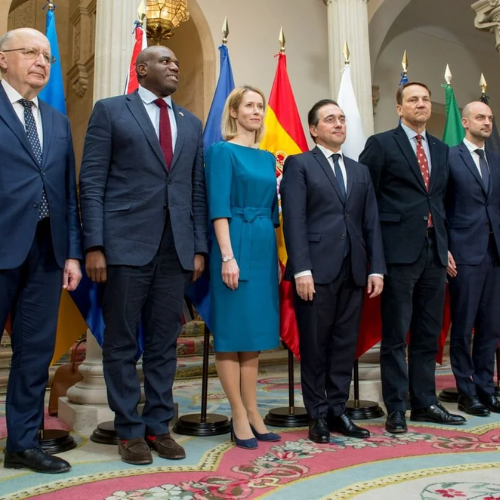A group of European countries, known as the Weimar+ group, has announced a major increase in aid for Ukraine. This includes military, political, and humanitarian support. Their goal is to help Ukraine defend itself and ensure the country has a fair chance to secure peace.
The Weimar+ group consists of key European nations, including Spain, Germany, France, Italy, Britain, and Poland, as well as European Union foreign policy chief Kaja Kallas. They came together on March 31 to discuss how they can strengthen Ukraine’s position against Russia’s ongoing attacks.
They also warned Russia that more sanctions could be placed on it if Moscow does not stop its aggression.
The foreign ministers in the group called on Russia to agree to an immediate and fair ceasefire. However, Moscow has refused to accept a 30-day ceasefire agreement that Ukraine and the U.S. reached earlier in March.
Russian President Vladimir Putin has instead demanded conditions that could weaken Ukraine’s ability to fight back, such as stopping all foreign military aid to Kyiv.
Trump Furious at Putin’s Ukraine Remarks, Threatens Economic Sanctions
Russia Continues Attacks Despite Truce Efforts
Even though there was an attempt to secure a ceasefire, Russia has continued its attacks. On March 27, Russian forces targeted energy facilities in Kherson, leaving many without power. This happened even though Russian officials had earlier claimed they had stopped such strikes since March 18.
The Weimar+ countries strongly condemned these actions and reaffirmed their commitment to helping Ukraine. They believe that for any future peace deal to be fair, Ukraine must receive strong security guarantees. They also rejected any agreement that would weaken Ukraine’s military or prevent allied forces from helping Kyiv in the future.
In addition to supporting Ukraine, the Weimar+ nations emphasized their commitment to holding Russia accountable for war crimes. The meeting on March 31 was particularly significant as it took place on the third anniversary of Ukraine’s recapture of Bucha. In 2022, after Russian forces left Bucha, the world was shocked to discover mass graves and evidence of executed civilians in the streets. The Weimar+ group vowed to support international efforts to prosecute those responsible.
Meanwhile, U.S. President Donald Trump claimed on February 24 that Vladimir Putin would allow European peacekeepers to operate in Ukraine as part of a settlement. However, Russian Foreign Minister Sergey Lavrov publicly rejected the idea, making it clear that Moscow has no intention of permitting foreign peacekeepers in the conflict zone.
Ukraine Open to Easing Russia Sanctions if Peace is Secured
Frozen Russian Assets to Stay Inaccessible
Another major topic discussed was the issue of Russian assets that were frozen after the full-scale invasion in 2022. Around $300 billion worth of Russian money has been blocked by Western nations, with most of it held in European banks. The Weimar+ group made it clear that this money will not be given back to Russia unless it fully ends the war and pays for the damage it has caused in Ukraine.
So far, Ukraine has received financial help through loans backed by interest earned on these frozen funds. However, Ukrainian leaders have repeatedly asked for the full amount to be confiscated and used directly for rebuilding the country and strengthening its defense.
The Weimar+ group was formed in February 2025 to respond to shifting global policies, especially after direct negotiations between Donald Trump and Vladimir Putin left European nations out of key discussions. By standing together, these European countries aim to take a stronger role in shaping peace efforts and ensuring justice for Ukraine.
For now, the message from Weimar+ is clear: Europe is ready to increase its support for Ukraine and take tougher actions against Russia if necessary.


